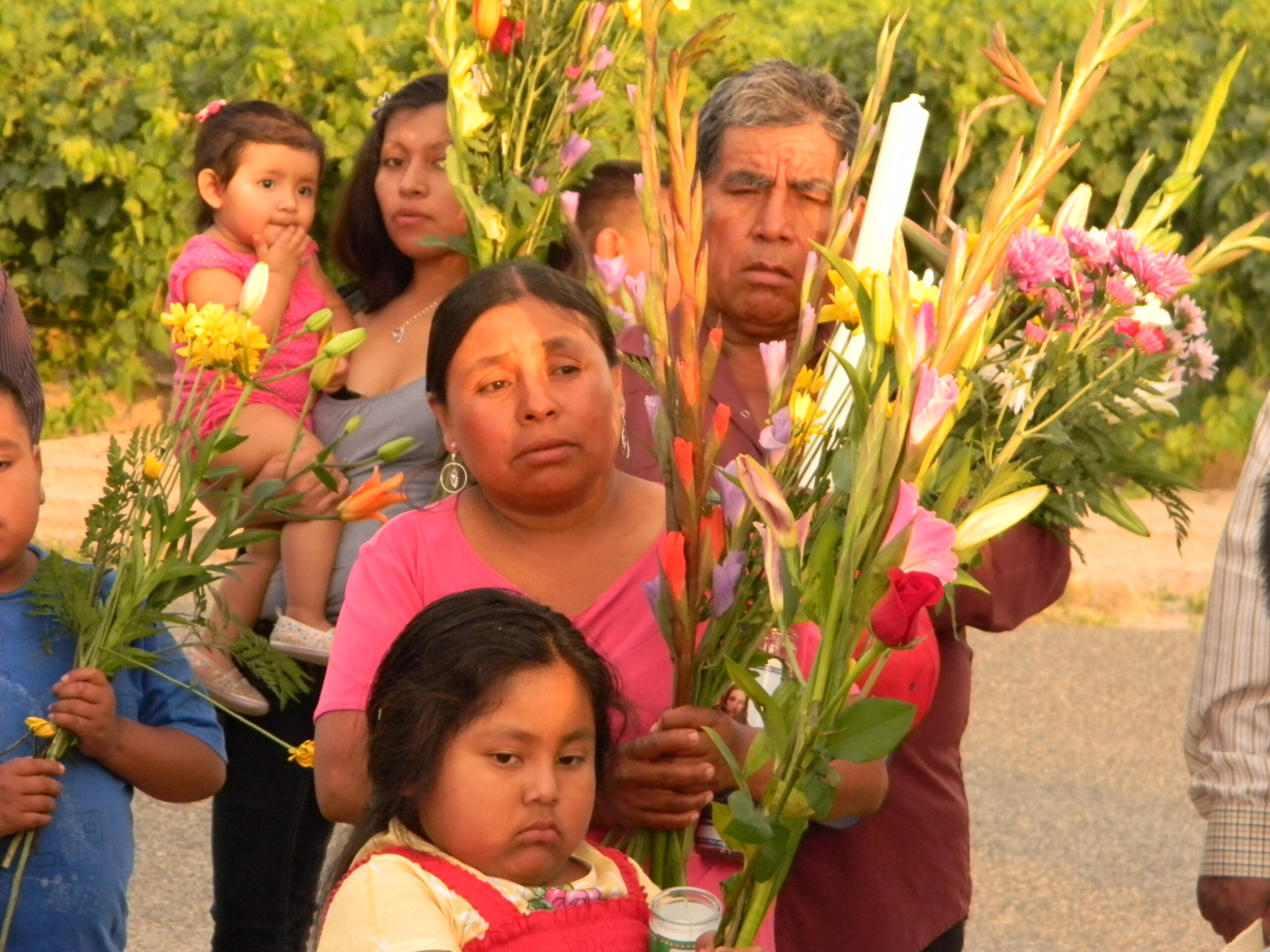Gratitud / Gratitude
[I wrote the following article for a special edition of National Catholic Rural Life Magazine in 2012. It was part of a special publication about developing a “right relationship” with realities of life in rural America. Other articles spoke of relationships with environment, family, education, health care, etc. My assignment was about relationship with immigrant farm workers.]
Right relationships with immigrant farm workers
A migrant farm worker at the end of a day said, “Padre, today my crew picked forty tons of cherries. Tomorrow these cherries will be on tables in New York, London, and San Francisco. We have done something good for the world and tomorrow we will pick another forty tons.” This man’s pride in putting food on the world’s tables speaks to the purpose of agriculture.
A farmer speaking of his workers seeks to draw attention to the respect owed to those who work in his orchard by always speaking of them as “my skilled agricultural workers.” He says this to respond to the rhetoric of the anti-immigrant groups insulting the immigrant worker as “unskilled labor.” There is an art to picking fruit properly, not bruising the fruit or damaging the tree or vine. He says, “I need skilled workers, not everyone can do this work.”
In 2012, Immigration Customs Enforcement (ICE) raided a migrant farm worker community at 3:00 a.m. Six women and twenty children saw their husbands and fathers taken away in chains. The men were deported within a week. No provision was taken by authorities to protect or care for these children. Local churches, schools and community services stepped in, but they were ill equipped to address their needs sufficiently, especially the needs of the children.
The situation of the immigrant farm worker is a complex reality of concerns involving economics, environment, labor negotiations, safety, immigration, politics, and mobility. In a letter to immigrants on the feast of Our Lady of Guadalupe the Hispanic/Latino Bishops of the U.S. stated, “The economic crisis has had an impact on the entire U.S. community. Regretfully, in reaction to this environment of uncertainty, some people show disdain for immigrants and even blame them for the crisis. We will not find a solution to our problems by sowing hatred. We will find the solution by sowing a sense of solidarity among all workers and co-workers —immigrants and citizens—who live together in the United States” (USCCB, Dec. 12, 2011).
Respect for Workers
The fundamental path to right relationship with those who work the fields is respect. There is a lack of respect in American society for the work, the worker, and the immigrant. Lack of respect hurts the worker, the employer, the environment, and all of society. In the end, all are victims of this lack of respect. The noble work of planting, cultivating and harvesting food is undervalued.
The worker and the farmer are caught in pressures that strain their relationships. The great cloud over right relationship with the immigrant farm worker is the injustice of a broken system of immigration. There are no easy answers. Family unification and the protection of children require courage and compassion in American society.
Our Catholic response to promoting right relationship with farm workers begins with a profound commitment to respect. We say casually, “Respect Life.” We need to personalize that respect. The workers in the field or vineyard, “respect them.” The children lacking many of the necessities of life and human dignity, “respect them.” The farmers struggling in today’s economy trying to make things right for their workers, “respect them.” And when you sit down to a meal, say a prayer thanking all who provide food for the world.
[Escribí el siguiente artículo para una edición especial de National Catholic Rural Life Magazine en 2012. Era parte de una publicación especial sobre el desarrollo de una “relación correcta” con las realidades de la vida en las zonas rurales de Estados Unidos. Otros artículos hablaban de las relaciones con el medio ambiente, la familia, la educación, la atención médica, etc. Mi tarea era sobre la relación con los campesinos migrantes.]
Buenas relaciones con los trabajadores agrícolas inmigrantes
Un campesino migrante al final del día dijo: “Padre, hoy mi equipo recogió cuarenta toneladas de cerezas. Mañana estas cerezas estarán en las mesas de Nueva York, Londres y San Francisco. Hemos hecho algo bueno por el mundo y mañana recogeremos otras cuarenta toneladas”. El orgullo de este hombre de poner comida en las mesas del mundo habla del propósito de la agricultura.
Un agricultor hablando de sus trabajadores busca llamar la atención sobre el respeto que se les debe a los que trabajan en su huerta al hablar siempre de ellos como “mis trabajadores calificados”. Dice esto para responder a la retórica de los grupos antiinmigrantes que insultan al trabajador inmigrante como “mano de obra no calificada”. Hay un arte en recoger la fruta correctamente, sin manchar la fruta ni dañar el árbol o la vid. Él dice: “Necesito trabajadores calificados, no todos pueden hacer este trabajo”.
En 2012, el Servicio de Control de Aduanas de Inmigración (ICE) hizo redada a una comunidad de campesinos migrantes a las 3:00 a.m. Seis mujeres y veinte niños vieron cómo se llevaban encadenados a sus esposos y padres. Los hombres fueron deportados en una semana. Las autoridades no tomaron ninguna medida para proteger o cuidar a estos niños. Las iglesias locales, las escuelas y los servicios comunitarios intervinieron, pero estaban mal equipados para atender sus necesidades de manera suficiente, especialmente las necesidades de los niños.
La situación del campesino inmigrante es una realidad compleja de preocupaciones que involucran economía, medio ambiente, negociaciones laborales, seguridad, inmigración, política y movilidad. En una carta a los inmigrantes en la fiesta de Nuestra Señora de Guadalupe, los obispos hispanos / latinos de los Estados Unidos declararon: “La crisis económica ha tenido un impacto en toda la comunidad estadounidense. Lamentablemente, en reacción a este entorno de incertidumbre, algunas personas muestran desdén por los inmigrantes e incluso los culpan de la crisis. No encontraremos una solución a nuestros problemas sembrando odio. Encontraremos la solución sembrando un sentido de solidaridad entre todos los trabajadores y compañeros de trabajo, inmigrantes y ciudadanos, que viven juntos en los Estados Unidos” (USCCB, 12 de diciembre de 2011).
Respeto a los trabajadores
El camino fundamental para una relación correcta con quienes trabajan en el campo es el respeto. Hay una falta de respeto en la sociedad estadounidense por el trabajo, el trabajador y el inmigrante. La falta de respeto daña al trabajador, al empleador, al medio ambiente y a toda la sociedad. Al final, todos son víctimas de esta falta de respeto. El noble trabajo de plantar, cultivar y cosechar alimentos está infravalorado.
El trabajador y el agricultor están atrapados en presiones que tensan sus relaciones. La gran nube sobre la relación correcta con el trabajador agrícola inmigrante es la injusticia de un sistema de inmigración roto. No hay respuestas fáciles. La unificación familiar y la protección de los niños requieren coraje y compasión en la sociedad estadounidense.
Nuestra respuesta católica para promover una relación correcta con los trabajadores agrícolas comienza con un profundo compromiso de respeto. Decimos casualmente, “Respeta la vida”. Necesitamos personalizar ese respeto. Los trabajadores del campo o de la viña, “respétenlos”. Los niños que carecen de muchas de las necesidades de la vida y la dignidad humana, “respétenlos”. Los agricultores que luchan en la economía actual tratando de hacer las cosas bien para sus trabajadores, “respétenlos”. Y cuando te sientes a comer, di una oración agradeciendo a todos los que brindan alimento al mundo.





